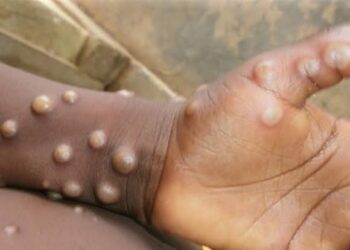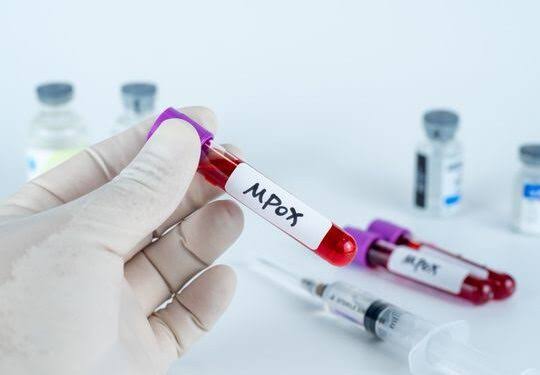In response to the monkey pox (Mpox) outbreak, the federal government has increased monitoring and screening processes at all entrance ports around the country.
Prof Muhammad Pate, Coordinating Minister of Health and Social Welfare, made the announcement in a statement issued on Thursday by his Special Adviser on Media and External Relations, Tashikalmah Hallah.
On Tuesday, the Africa Centre for Disease Control declared a public health emergency because to the continent’s expanding mpox outbreak. The pandemic has spread to other African countries, including the Democratic Republic of Congo.
In the Democratic Republic of the Congo, there is a severe and spreading outbreak that has now spread outside the nation.For the first time, a novel viral strain that first appeared in September 2023 has been found outside of the Democratic Republic of Congo.
The World Health Organisation emphasised that the discovery of clade 1b, a new virus strain that emerged in the Democratic Republic of the Congo last year and spread quickly, is particularly concerning.
It appears to be primarily spreading through several networks, and its detection in neighbouring countries is one of the main reasons for the PHEIC.

In2024 alone, there have been reports of around 2,863 confirmed cases of mpox and 517 deaths among 13 African countries.
Since the start of 2024, 33 States and the Federal Capital Territory have reported 39 confirmed cases and no deaths in Nigeria.
Mpox is an uncommon infectious disease caused by a virus that is spread from animal to human, or zoonotic disease. It is endemic in several African nations, notably the tropical rainforests of Central and West Africa. Although the precise source of the virus remains unknown, rodents, squirrels, and monkeys are thought to be involved in its spread.
The mpox virus can be transmitted both from animal to human and from human to human. Animal-to-human transmission can occur by direct contact with infected animals’ blood, bodily fluids, skin, or mucosal sores (for example, monkeys, squirrels, and rodents).
This can occur as a result of a bite, scratch, handling, or eating undercooked or other infected bushmeat products. Human-to-human (P2P) transmission occurs when a person comes into contact with the virus from an infected person or virus-contaminated objects, such as clothing or bedding.
Symptoms of the sickness include fever, headache, muscle aches, weakness, swollen lymph nodes (glands), and a rash.
After one to three days of fever, the rash appears, starting on the face and extending across the body, with the face and palms/soles being the most affected.
They can also occur in and around the genitals, which is why touch during sex is an additional method of infection. “The Coordinating Minister of Health and Social Welfare, Prof Muhammad Pate, emphasised that the country has intensified monitoring and screening procedures at all entry points in response to the threat of Mpox, Clade 1,” the statement went on to say.
The minister added that the Nigeria Centre for Disease Control and Prevention and the Nigeria Ports Health Services, both under the Federal Ministry of Health and Social Welfare, had been working to strengthen Nigeria’s defences prior to the declaration of mpox as a public health emergency.
“This Mpox Clade 1 strain has killed up to 10% of those who have fallen ill in prior outbreaks. He stated that the goal is to address and limit its effects by implementing steps similar to those utilised during the COVID-19 epidemic.
He went on to say that the government has put in place a new requirement that all visitors fill out an online health declaration form before leaving the country.
“This measure is being introduced alongside the activation of infectious disease centres in all 36 states and the Federal Capital Territory,” continued the minister.
The minister further recommended the public to maintain good hygiene by often washing their hands with soap and water or using an alcohol-based hand sanitiser, particularly after coming into touch with an infected person or animal.
Key Points to Consider
1. Proactive Surveillance and Screening
Strengthening monitoring and screening at entry points is critical in preventing the importation of Mpox cases, especially with the virus’s ability to spread quickly from human to human and from animals to humans. This approach, similar to measures taken during the COVID-19 pandemic, underscores the importance of early detection in managing outbreaks
2. Regional Coordination and Response
The outbreak in the Democratic Republic of Congo and its spread to other African countries highlight the need for regional cooperation. Nigeria’s involvement in broader continental efforts, as led by the Africa CDC, will be crucial in mitigating the outbreak’s impact across the continent
3. Public Health Preparedness
The activation of infectious disease centers in all 36 states and the Federal Capital Territory is a positive step. It ensures that the country is prepared to handle potential cases and provides a framework for effective treatment and isolation to prevent further spread.
4. Public Awareness and Hygiene Practices
Encouraging the public to maintain good hygiene practices, such as regular hand washing and the use of hand sanitizers, is vital in curbing the spread of the virus. Public education on Mpox symptoms and transmission methods is also important, as it empowers individuals to take preventative measures.
5. Challenges and Considerations
While these measures are commendable, their effectiveness will depend on consistent enforcement and public compliance. The government must ensure that border screening processes are thorough and that the health declaration forms are used effectively.
Additionally, there should be clear communication to avoid public panic and to inform the public on how to seek help if they suspect infection.

















